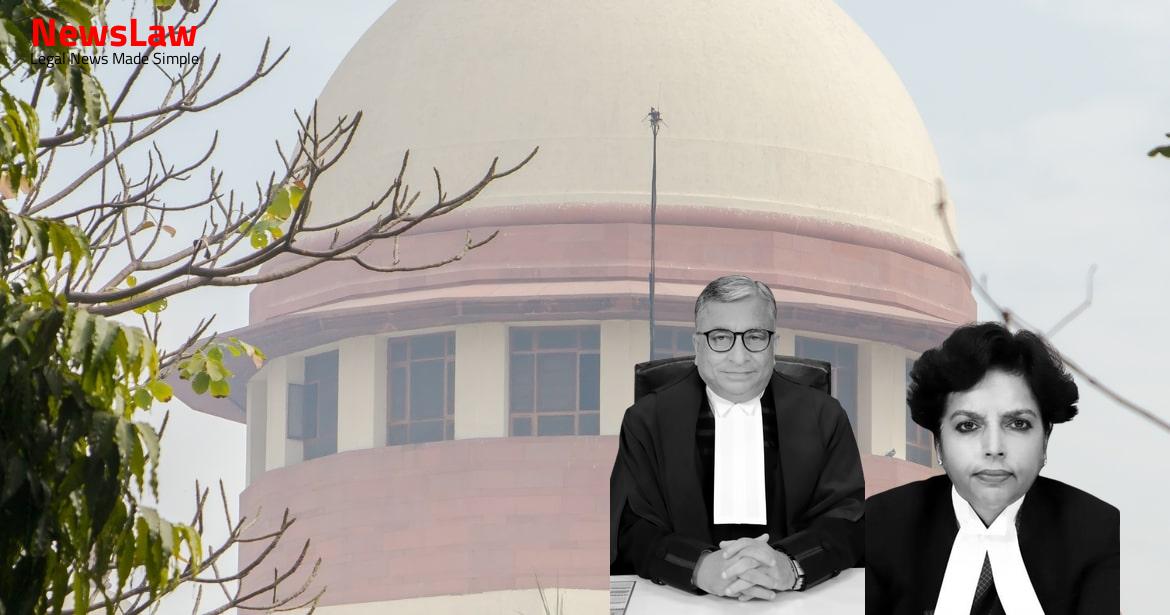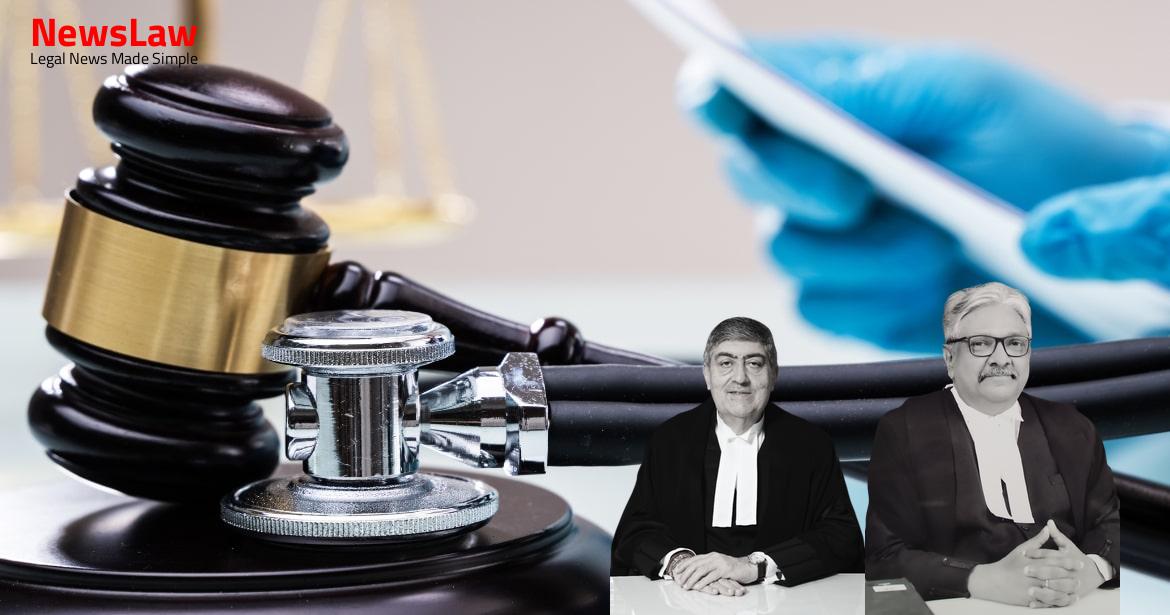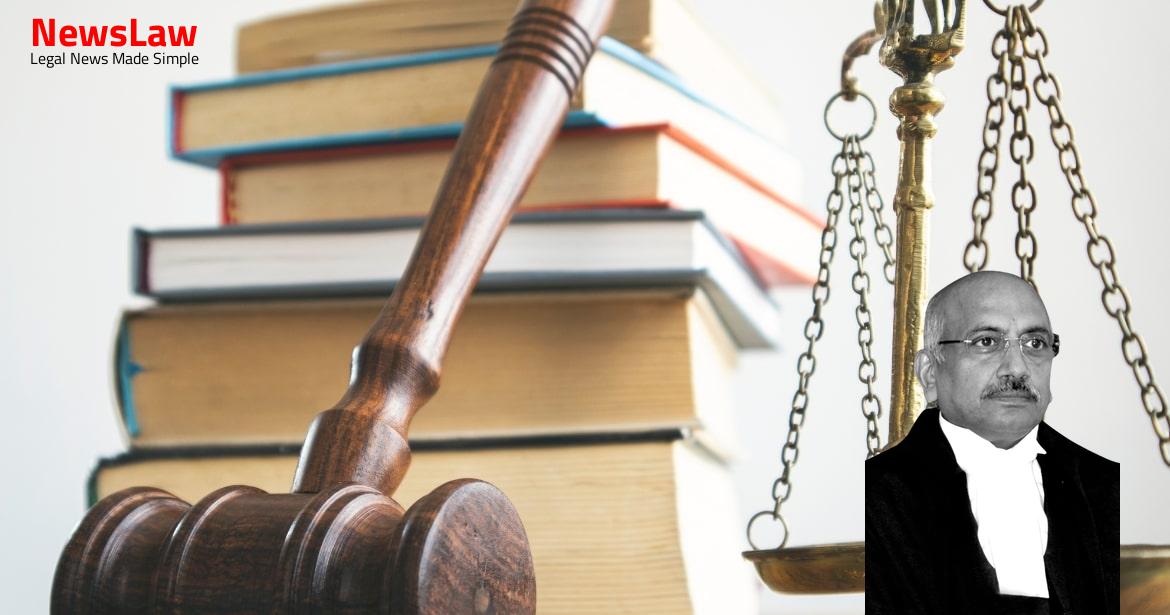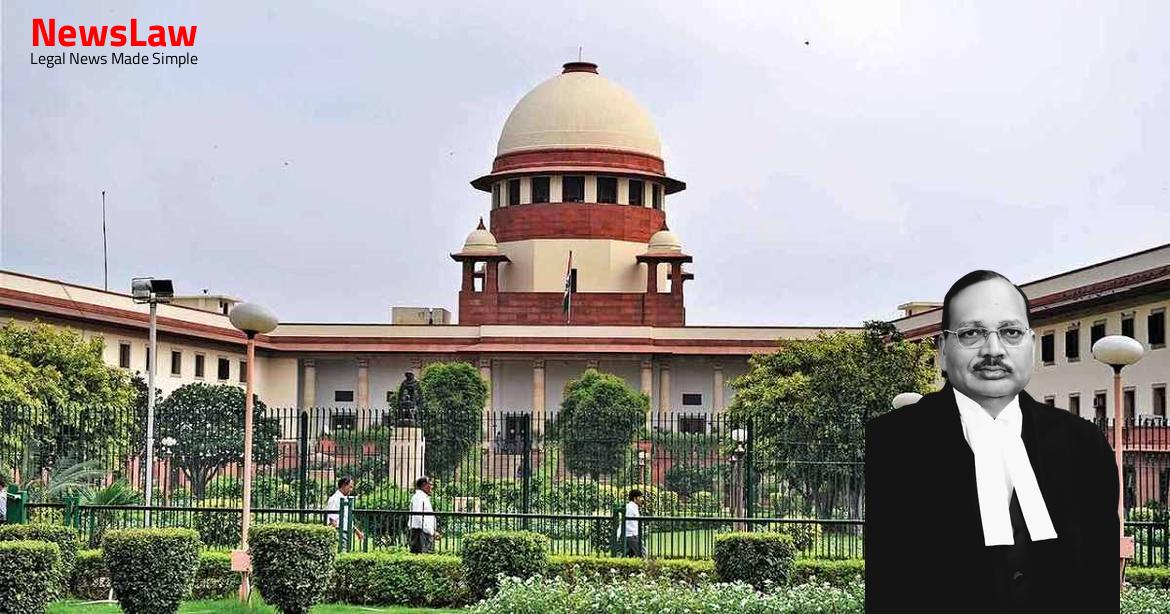The case revolves around the critical legal analysis conducted by the court in granting bail to the accused. The emphasis is on the court’s meticulous examination of various factors and the exercise of judicial discretion. This summary sheds light on the importance of thorough legal scrutiny in bail granting decisions.
Facts
- The Accused No 6 threatened to have more after a confrontation.
- The deceased intervened in a scuffle and was pushed by Accused No 6.
- The deceased, Abdul Lathif, intervened to protect his son-in-law from being assaulted.
- The High Court allowed the anticipatory bail applications of Accused No 6 and 8 based on witness statements, recovered articles, medical opinion, and FSL report.
- The High Court dismissed vital material against the Respondents while granting bail.
- The detailed incident on 05.06.2020 involved an attack on the Appellant, two witnesses, and the deceased by Accused No 2 to 10 near HDFC Bank.
- Accused No 1 allegedly conspired to eliminate Badrul Muneer and was charged along with the other accused.
- The Respondents have been charged under various sections of the IPC in connection with the incident.
- The injured witnesses, deceased, and the appellant are related.
- The appellant’s son-in-law is Badrul Muneer, who was being targeted in the attack.
- The Respondents, Mohammed Bhava & Mohammed Musthafa, were Accused No 6 and Accused No 8 in the FIR.
- The appeals are against the High Court’s judgments in Criminal Petitions.
- Sections 114, 109, and 120B of IPC were added post-investigation.
- High Court initially granted bail to Accused No 1 as other co-accused were also granted bail.
- High Court later canceled bail granted to all other accused present at the scene of the offense.
- The High Court’s decision to grant bail to Accused No 1 in a premeditated murder case was deemed in error.
- The accused had instigated and participated in a heinous crime, posing a significant threat to prosecution witnesses.
- The final order of the court dated 11.01.2022 allowed the appeal and revoked the bail granted to Accused No 1.
Also Read: Assessment of Loss of Earning Capacity in Motor Accident Claim
Arguments
- The aggrieved complainant argues that the High Court made errors in not considering the gravity of the offences and overlooking the eye-witness accounts and other available evidence.
- The grant of bail is contingent on the contextual facts of the case being dealt with, as facts vary from case to case.
- An order for bail without cogent reasoning cannot stand.
- The complainant contends that the impugned orders lacked proper consideration of the gravity and nature of the offences committed by the accused Respondents.
- The placement of the accused in society may be a factor in bail consideration but must be coupled with other circumstances warranting bail.
- The nature of the offence is a crucial factor in bail decisions; more serious crimes are less likely to be granted bail.
- All remaining accused whose bails were cancelled have not surrendered yet.
- Accused No. 6 asserts that he had no role in the offence and was named in the FIR out of personal animosity.
- The accused have been allegedly threatening the appellant and other witnesses involved in the trial.
- The appellant cites the judgment in Ram Govind Upadhyay Vs. Sudarshan Singh and Others, emphasizing the need for judicious exercise of discretion in granting bail.
- Accused No.8 contends that his name was only added to the FIR based on a subsequent statement made by the appellant under section 161 Cr.P.C.
- Allegations of instigation against the accused are deemed hollow and unproven.
- The Appellant is portrayed as a tool used by Badrul Muneer and his family.
- The appellant’s sweeping allegations against the respondent are considered contrary to the material on record.
- Citing various judgments, it is emphasized that strong circumstances are required for bail cancellation, and bail cannot be revoked mechanically without considering supervening circumstances that may impact a fair trial.
- The key issue is whether the High Court exercised discretion mechanically in granting bail to both the accused.
- The accused was portrayed as attempting to separate individuals involved in the act.
Also Read: Enhancement of Compensation in Workmen’s Compensation Act Case
Analysis
- The High Court failed to consider the nature of accusations and relevant evidentiary material against the accused Respondents while granting bail.
- The accused group was instigated by Accused No. 6 to continue their assault, indicating a high level of involvement.
- Cancellation of bail is difficult and requires overwhelming circumstances.
- Basic principles for deciding on bail applications must be considered.
- Witness statements and medical reports indicate a common objective in the assault and murder of the deceased.
- Supervening circumstances are necessary for bail cancellation.
- Accused No. 8’s involvement in the assault was confirmed by witnesses and records.
- Accused No. 1 orchestrated the assault on two witnesses, indicating conspiracy.
- Enlargement of accused on bail was not justified given the gravity of the offense and evidence.
- Accused No. 6 and 8 were released on bail by the High Court due to lack of prima facie materials, but the discretion should have been exercised judiciously.
- Factors to consider when granting bail include the prima facie evidence of the accused committing the offense, nature and severity of the accusation, potential punishment, risk of absconding, character of the accused, likelihood of reoffending, witness interference, and potential for justice obstruction.
- Cancellation of bail requires very strong reasons such as interference with justice, evasion of justice, abuse of the concession, or absconding risk.
- Bail revocation can occur if relevant factors were not considered or if the gravity of the offense and societal impact were overlooked.
- Courts must provide reasons for granting bail, especially in serious offense cases, despite not delving deeply into the evidence.
- Superior courts can intervene if the lower court did not properly assess the relevant material, gravity of the offense, or societal impact.
- Bail can be revoked if it was granted mechanically or without considering crucial aspects of the case.
- Bail initially granted to Accused No 2,3,4,7,9 & 10 by the High Court was cancelled by the High Court itself.
- The High Court did not consider the basic principles for grant of bail established by various judicial pronouncements.
- Sufficient material exists against the accused Respondents to establish a prima facie case against them.
Also Read: Determining Compensation in Motor Accident Claim Cases: Legal Analysis
Decision
- Impugned orders dated 08.02.2021 and 19.10.2020 passed by the High Court of Karnataka at Bengaluru in Criminal Petition No 6052/2020 and Criminal Petition No 3902/2020, releasing Accused No. 6 and 8 on bail, are set aside.
- Bail granted to Accused No. 1 has been cancelled by this Court vide order dated 11.02.2022 in Criminal Appeal No 79/2022.
- Respondents-accused are directed to surrender before the trial court within two weeks from today, failing which they shall be taken into police custody as per the order dated 20.10.2021 in SLP (Crl.) No 7586-7592 of 2021.
Case Title: IMRAN Vs. MOHAMMED BHAVA (2022 INSC 467)
Case Number: Crl.A. No.-000658-000658 / 2022



